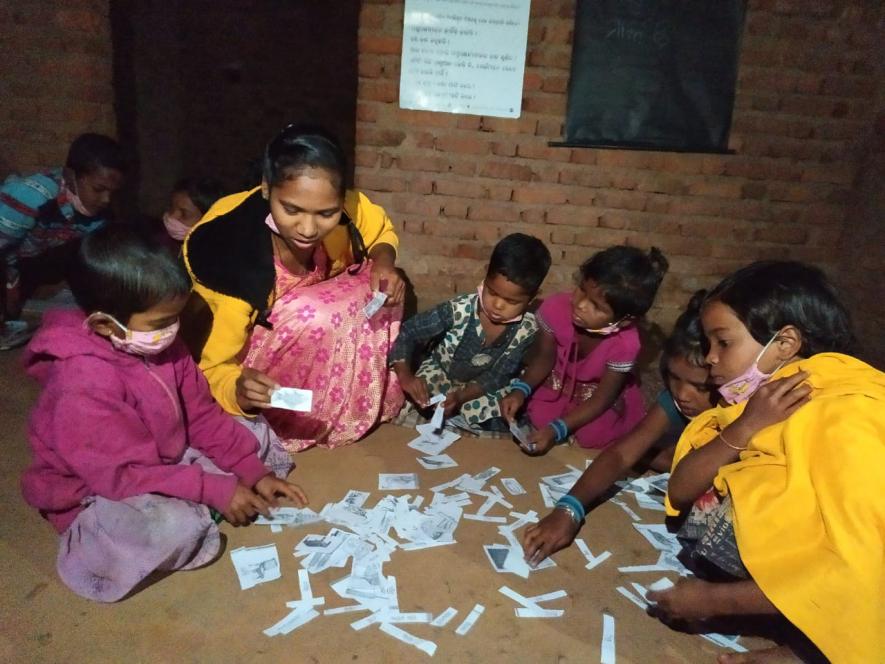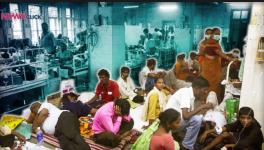In Odisha's Rayagada, Night Schools Keep Girls Learning Through COVID-19 Lockdown

Santoshi and children at night school
A government survey of 15 lakh schools has showed that only 22% of schools in India had Internet connectivity and that a large number of children across the country were denied any schooling at all during the COVID-19 lockdown that was first announced in March 2020 and remained in force with some relaxations through the academic year. Even so, in Kashipur in Odisha's Rayagada district, night schools ensured that young girls kept learning.
Monni Ma was disturbed that her child was not getting any schooling at all, and one month after the lockdown was first announced, she made her way to her daughter’s teacher. Her daughter attended a school run by the NGO Agragamee. Monni Ma went with five other women, all parents of girls who regularly attended the school at Kashipur.
'We send our daughters to you for an education. If you will not open the school, what will happen to them?' they asked. The NGO workers had no immediate answer. They too did not know how much longer would the lockdown last for. This was also at a time when the novel coronavirus had still not spread to rural India, and the clampdown of all regular activities across the nation was difficult to comprehend.
NGO workers conferred with each other and then decided to spread out into the local community. “We asked people what they wanted; we took suggestions on how we might continue to have functioning schools. No one had any idea of how long the lockdown would last, and when we might be able to resume school. There were no clear answers,” said Vidhya Das of Agragamee.
Villagers suggested that school sessions could be held by night. Many of the older villagers had attended night schools that Agragamee ran years ago. Some had picked up basic literacy at those classes. “It was agreed that villagers would provide the space and that classes would continue,” Das said.
Kashipur is a hilly area, and the Eastern Ghats are not best covered by internet service providers. Online education was next to impossible. Nothing works as well as regular face-to-face interactions, and a learning environment that is conducive to children. It was with that realisation that Agragamee first started four night shelters in May 2020.
What started as a small effort in response to the demands of local women soon grew, as demand for such schools came in from more people. There are now 25 learning centres in different parts of the district.
As word spread, resources were raised to keep these centres functional. Besides individual donations, Wipro Foundation, Jamnalal Bajaj Foundation, Giving Circle-Centre Foundation and Raghuraj and Vimal Foundation made donations. The night schools were becoming very popular, as villagers also had some regular activity to look forward to.
Agragamee hired teachers from the local community, and some of the young teachers were students from the higher classes at the school itself. Basic training was provided to teachers, who were also given instructions on how to keep track of classwork by maintaining a register. Flash cards were provided so teachers had a few learning tools too.
Weekly review sessions are now held, and teachers get together to discuss any hurdles in their path. Many young teachers, themselves students, were initially reluctant to start singing as part of teaching activities. They were gently encouraged, and the children who remembered the songs just began to sing and teach them too.
A year after the night schools first started, children who had earlier dropped out of school are now returning to the learning centres – the teaching and learning has continued. Seventeen-year-old Santoshi has spent a whole year teaching at the Parajasilla Learning Centre. She must soon return to school, where she is herself a student of Class 11. Her students love her, and often arrive at the centre long before she does. Does she look forward to returning to her old routine? “I will try and continue to teach – these classes happen by night, so there is a chance I will be able to continue to teach,” she said.
Many government schools in rural Odisha have been shut in recent years. The Hindu reported that in 2016, 828 government primary and upper primary schools were shut, as they had less than 10 students enrolled. This was part of the state government effort to “rationalise” schools – shutting down those with poor enrolment and merging schools. That move has made it hard for many girls to attend school, especially in tribal areas like Rayagada and Kandhamal, where children may have to travel further away. Parents fear for their safety as the region has a history of Maoist activity.
The government has opened residential schools, where children spend long spells of time away from families. In the state capital of Bhubaneswar, the private Kalinga Institute of Social Sciences boasts of being the “world’s largest boarding school”, with 27,000 pupils, most of them from tribal communities. This variety of mass education, though, is highly problematic and could be used as a tool for denuding children of the culture and traditional knowledge of their communities.
It is in this context that learning centres like the ones that Agragamee runs have become popular. “We would like to cover 100 villages and open more centres. A large number of students drop out as they cannot cope with the pace of a regular school; they come from families where they are first-generation school goers. The night schools are more informal spaces, and there are children of mixed age-groups there. So, these are friendlier spaces for drop-outs or older children. Each centre costs about Rs 1.5 lakh to run for one year. Once we raise funds, we would like to expand the number of these centres," said Das.
The author is a freelance journalist based in Pune.
Get the latest reports & analysis with people's perspective on Protests, movements & deep analytical videos, discussions of the current affairs in your Telegram app. Subscribe to NewsClick's Telegram channel & get Real-Time updates on stories, as they get published on our website.























